“But then, there must not be too much sea. The strongest eyes and nerves could not support the glare and oppressive vastness of an unrelieved expanse of waters.”
Harriet Martineau, Life In The Sick-Room : Essays Of An Invalid (1844)

This, from Ptak Science Books, is simply magnificent:
M Maid Fainting
For the millions of Americans who were newly affluent in 1925 but not affluent enough to afford a fainting maid that they could attend to came the Maid Fainting Society Inc of America. Bonded in 15 states, MFSA sponsored overseas maids to faint in good American homes. They were hired out at $4/hour (a handsome hourly sum in 1925), the fainting maids being allowed to keep half. In 1926 a sub-cult of Extra-Tall Fainting Maids was born (an example of which is pictured above), and provided an income to thousands for several years. (One of the last silent films ever made, Fainting Maid Maiden, with Clara Bow, 1944, used this phenomenon as a basis for its story; by that time however the craze had passed, the war was on, and no one cared any more for silent films about fainting maids.)
A letter arrives from Peter Christian:
Dear Frank, he writes, Have you been moonlighting over at the Dictionary of National Biography, or have they been somehow stealing your unpublished works? The following DNB entry is a blatant fiction, and its Hooting Yard origins manifest, I would say:
“Cowley, Sir John Guise (1905–1993), army officer, was born at Mussooree, in the foothills of the Himalayas, during an earthquake on 20 August 1905, the son of the Revd Henry Guise Beatson Cowley, army chaplain, and his wife, Ethel Florence (née Prowse). When the family returned to England by ship John won a contest for the ugliest baby on board. His early years were spent in a Dorset village, where his father was the rector and Thomas Hardy was a neighbour. He recalled Hardy as a sad, wizened old man who spoke seldom but who occasionally, though an atheist, attended church services, at which he always asked Cowley’s father to read the same passage from the Bible—Elijah’s vision of the earthquake.”
More from Martineau:
“I would recommend… the project of drawing sunbeams from cucumbers, as a solace on the rack.”
Harriet Martineau, Life In The Sick-Room : Essays Of An Invalid (1844)
Last week, you will recall, I issued a ukase that Hooting Yard readers must adopt a lobster. I am pleased to note that Babinsky and Bobnit Tivol have been named and adopted and are presumably clacking away in the vicinity of Padstow.
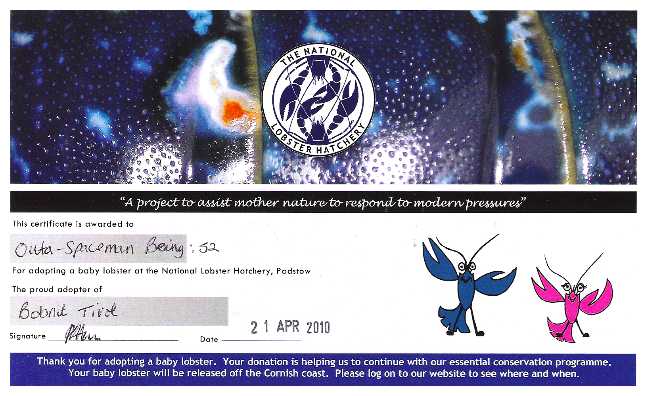
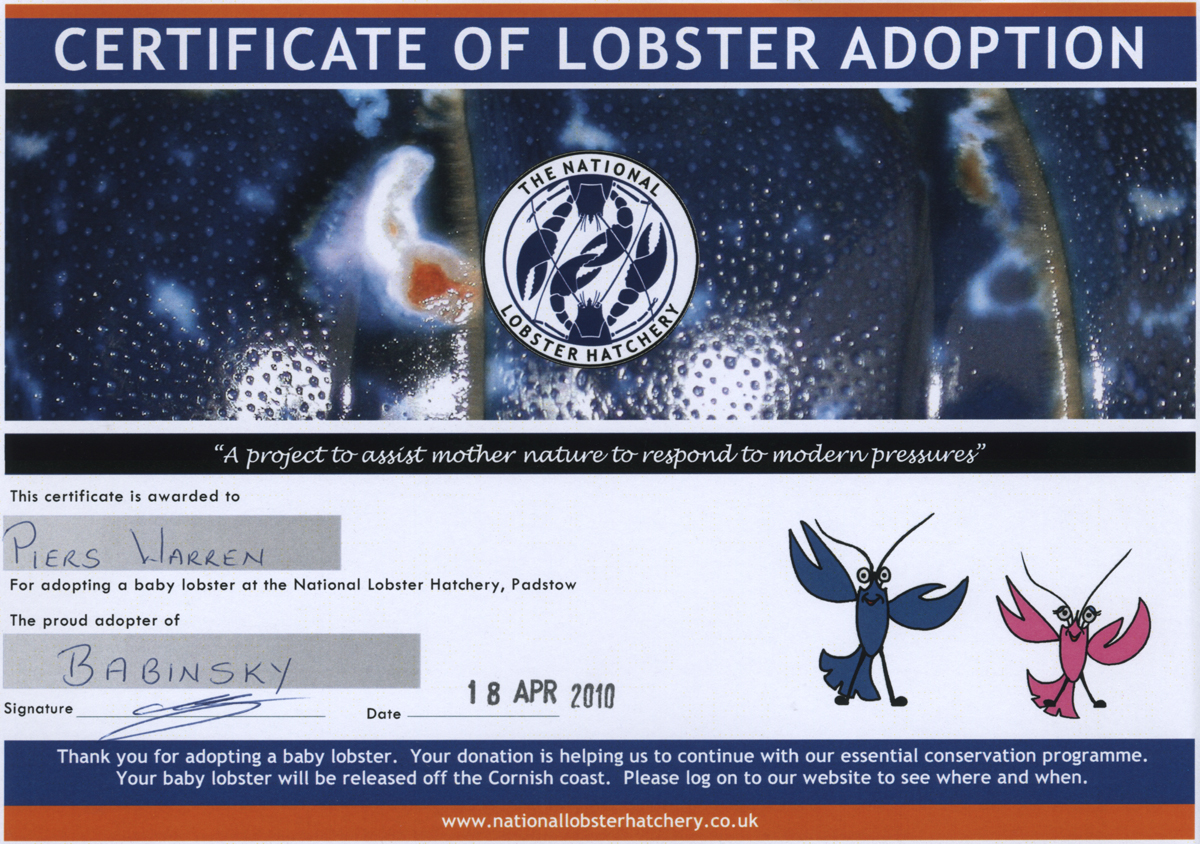
UPDATE : Now joined by Tiny Enid!
I know I promised not to babble on about the general election, but hope I will be forgiven for sharing with you this important note. Thanks to Gaw over at Ragbag, I learned that ‘Clegg’ is another word for a horse-fly. Here is the full OED definition, with handy quotations for use when a Liberal Democrat canvasser comes a-pounding at your door:
cleg
Also 5 clege, 6 clegge, 7-9 clegg.
A gadfly, horse-fly, or breeze.
a1449 W. BOWER in Fordun’s Scotichron. (1759) II. 376 The unlatit woman..pungis as the cleg. 1483 Cath. Angl. 66 A Clege. 1570 LEVINS Manip. 53 A clegge, flée, solipunga. 1656 Burton’s Diary (1828) I. 308 Sir Christopher Pack did cleave like a clegg, and was very angry he could not be heard ad infinitum. 1658 ROWLAND Moufet’s Theat. Ins. 936 The English [call it] a Burrel-fly, Stowt, and Breese: and also of sticking and clinging, Cleg and Clinger. 1855 ROBINSON Whitby Gloss., Clegs, the large grey flies which torment horses and cattle in summer. ‘He sticks like a cleg.’ 1872 Daily News 24 Aug., For animals of their size, ‘clegs’ are exceedingly light-footed.
b. Comb., as cleg-stung adj.
1808 MAYNE Siller Gun in Pop. Poems Scotl. (1862) 136 Like cattle prodit with a prong, Or cleg-stung fillies.
I think it is time for Hooting Yard to provide readers with life-lessons, some simple rules of conduct for prancing through a complicated world with elegance and brio. Mr Key is, of course, far too ignorant to be able to cobble together any such rules himself, so he will rely on the tried and tested wisdom of others. And to begin with, we have this unarguable rule to live by:
Never, ever question Higgins’ safety nous.
Make of that what you will, but bear in mind the awful fate of the last person who dared to question Higgins’ safety nous. Thereby hangs a tale to curdle the stomach and derange the collywobbles.
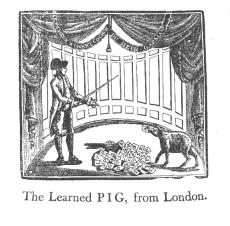
“Through a blue haze one saw the ground, covered with snow, shining under the magical moon… A piercing wind blew from the frozen river – the muff – if it would come it would keep her warm – … Like a knife they went through my soul – Rose petals – … I had been the momentary victim of a freakish fancy… The rain irritated me… Through her tears she saw a star shining in the night… War – It had shattered homes – brought skeletons – where once children laughed. Brought famine – once birds had eaten crumbs… Little fool muttered the maddened officer… A night of drunkenness, of horror, had passed in the Belgian chateau… Play on, he whispered. Play for me – for England – whose son I am… She saw no friends – the ones of former days – Nihilists. They were perhaps hiding in foreign lands – or were in the darker seclusion of some Siberian Prison… Speak, speak – Angel or demon, or both, speak to me before I throw you into the sea… The alienist gave his testimony. The prisoner was mad. Clearly… I shall have ceased forever, I hope, to count the bars of my iron door, my sole occupation and the one thing which keeps me from thinking too much of the past, so bitter… Lydia – risen from the ashes – walked out into the snow and cold… I found myself in a small room, blue with smoke and poorly furnished. An old man was cooking supper, as he hummed some weird old gypsy tune… The snow is falling and covering in white the grim rows of houses opposite my little shop, the streets are deserted save by a few hurrying pedestrians and some merry school children going down to the frozen river for an hour’s skating before dusk – … On the steps of this now abandoned house sat the muttering old woman… Strange, weird music of the desert played by slaves… The agonizing sorrow of Gethsemane again swept over Christ, as He stood by the Lake.”
What was that all about? Let me enlighten you. I took a snippet from each of the extraordinary Futurist Stories by Margery Verner Reed, published in 1919, and cobbled them together. I hope this drastic abridgement will persuade you to read the entire book. This is passionate, sometimes hallucinatory, prose, unlike anything I have read before, as if bulky 19th century novels had been boiled down to their emotional essentials.
Who was Margery Verner Reed, and in what sense did she understand Futurism? I have been unable to discover anything about her save that she also wrote Under-Currents and the splendidly-titled Prose Petals. Tireless literary researchers are implored to add their ha’porth in the Comments.
In considering this subject with the attention that is due to it, it has appeared to me that all the stories of ghosts and super, or, un-natural appearances, may be referred to some of the following causes:
1. To the augmentation produced by fear in any effect on the senses—thus the ear of a terrified man will convert the smallest noise into the report of thunder, or his eye will change the stump of a tree into a monster twenty feet high. As the senses are furnished for protection, their irritability, under the impression of fear, is part of their economy, as the means of preserving our being; but it is absurd to refer back the effects thus augmented, to external causes which might be capable of producing the augmentation. To such an error of the senses and of reasoning, is, however, to be referred half the ghosts and supernaturals of which we hear in village ale-houses, in nurseries and schools.
2. To diseased organs of sensation; as an inflamed eye producing the effect of flashes of light in the dark, or fulness of blood producing a ringing or singing in the ears. Sometimes diseases of the visual organs are accompanied by hallucinations of mind; and persons ill in fevers often see successions of figures and objects flit before their eyes till the disease has been removed. The workings of conscience or nervous affections will also produce diseases of the senses, and such hallucinations of mind as to occasion a person to fancy he sees another, or to be haunted by him. But there is nothing supernatural in all this; it is sometimes a local disease, sometimes an effect of fever, sometimes a nervous affection, and sometimes partial insanity.
3. To natural causes not understood by the parties. Thus, anciently the northern lights were mistaken for armies fighting; meteors and comets for flaming swords, portending destruction or pestilence; the electrified points of swords to the favour of heaven; the motions of the planets to attractive effluvia; and all the effects of the comixture of the gases to benign or diabolical agency, as they happened to produce on the parties good or evil. So in the like manner old houses are generally said to be haunted, owing to the noises which arise from the cracking and yielding of their walls and timbers, and from the protection and easy passage which in the course of time they afford to rats, mice, weasels, &c. whose activity in the night-time affords the foundation of numerous apprehensions and fancies of the credulous.
4. To spontaneous combustions or detonations, which produce occasional lights and noises, or, under unchanged circumstances, recurring lights and noises, chiefly claiming attention in the night. Thus houses shut up and unaired are apt, from the putrefaction of animal and vegetable matter, to generate hydrogen gas, the accidental combustion of which by contact with phosphoric matter, naturally generated in the same situation, will produce those effects of lights and noises heard in empty houses. So Church-yards, Churches in which the dead are buried, Cemeteries, and Ruins of old buildings, must frequently give out large quantities of these gases; and consequently, from exactly similar causes, they are likely to produce the very effects which we witness in the will-o’-the-wisp, or in hydrogen gas when inflamed during calm weather in marshy situations.
5. To the prevailing belief that effects, which cannot readily be accounted for, or which are caused by the contact of the invisible fluids or media always in action in the great laboratory of nature, are produced by the agency of spirits or demons; which belief, concurring with the unknown causes of the effects, and affording a ready solution of difficulties, prevents further inquiry, silences reasoning, and tends in consequence to sustain the prevailing errors and superstitions.
Such are the general causes of ghosts, spirits, charms, miracles, and supernatural appearances. They all arise either from hallucinations of the mind or senses; from the mutual action of the natural, though invisible, powers of gaseous and ethereal fluids; from the delusions of ignorance, implicit faith, or the absence of all reasoning.
Sir Richard Phillips, A Morning’s Walk From London To Kew (1817)
The giant ball of the earth. Above, day, and a tiny sun. Below, night, and stars, and the moon. Beyond the outer circle, nothing, nothing at all. “System According To The Holy Scriptures”. This is the Muggletonian Cosmos, as depicted in the nineteenth century by Isaac Frost.
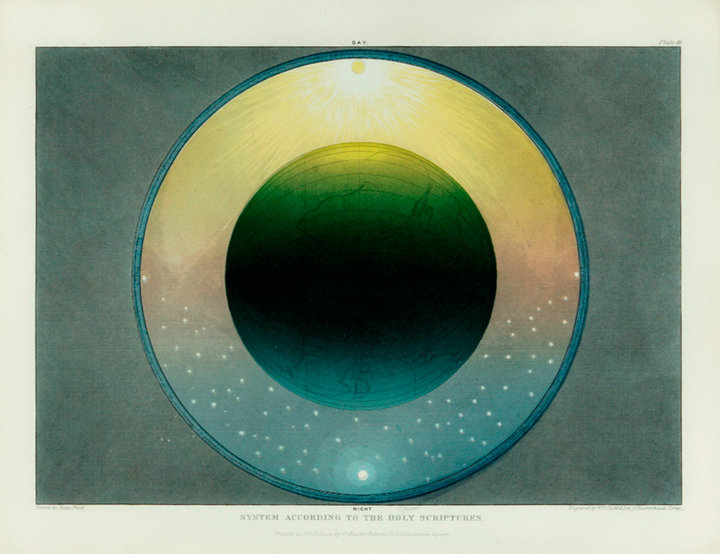
A big zoomable image can be found here, and another of Isaac Frost’s Muggletonian engravings is here. Many thanks to Ed Baxter for drawing them to my attention.
As we have learned, from time to time the so-called “real world” catches up with Hooting Yard in quite charming ways. And what could be more charming, and more like something I made up, than the chance to adopt a lobster? I have to say I am extremely impressed that the National Lobster Hatchery, which offers this splendid opportunity, insists that the first stage of the process is to Name Your Lobster. Thus is the act of naming given its proper, paramount importance.
These conscientious lobsterists at the Hatchery have gone to the trouble of listing all their thousands of adopted lobsters, at the point where they are released into the wild, and so will your adopted lobster appear on the website when its turn comes. Note my assumption that you will be adopting a lobster as soon as you have finished reading this. Do not let me down.
While I do not wish to dictate in so important a matter as lobster nomenclature, I cannot help thinking that it would be a fine thing indeed if the waters around Padstow were to have clacking about in them lobsters named after your favourite Hooting Yard characters, such as Dobson, Tiny Enid, Old Halob, Dennis Beerpint, Little Severin The Mystic (Badger) Lobster, and the rest. Go on, you know it makes sense.
Please leave a note in the comments when you have named and adopted your lobster.
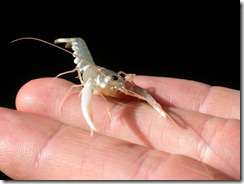
“This is accomplished by inserting the pig into a ‘pig launcher’… push it along down the pipe until it reaches the receiving trap – the ‘pig catcher’… there are “smart pigs” used to measure things… though some product can be lost when the pig is extracted… All systems must allow for the receipt of pigs at the launcher… pigs must be removed, as many pigs are rented… the pig can be ejected from the barrel and operators have been severely injured when standing in front of an open pig door… the pig is shuttled up and down… Modern intelligent pigs are highly sophisticated… Some smart pigs can combine technologies… the pig is unable to directly communicate with the outside world… It is therefore necessary that the pig use internal means to record its own movement during the trip… The original pigs were made from straw wrapped in wire… There are several types of pigs for cleaning… A pig has been used as a plot device in [the] James Bond film Diamonds Are Forever, where Bond disabled a pig… A pig was also used as a plot device in the Tony Hillerman book The Sinister Pig.”
My thanks to Duncsnoai Plover for drawing to my attention this exciting stuff about modern pigs (many of which are rented).
“out of insecurity and boredom I developed an elaborate form of displacement activity, a self-estranging technique, creating what I called ‘angel trap stationery’ — paper painted with symbols and impregnated with scents designed to attract various powers and dominions of the air to aid me in the act of composition.”
Peter Blegvad, interviewed in The Believer, November/December 2009
“His native land conquered, he had renamed himself the Great Wizard of the North and headed south to London. John Henry [Anderson]’s magical repertoire had grown accordingly, featuring egg-writing and an incomprehensible guinea pig trick, and he started something of a trend when he had become the first magician to pull a rabbit out of a hat… An unprecedented approach to advertising had seen whole towns papered with playbills announcing the most extraordinary sounding illusions, such as the ‘Grand Metamorphesian Wonder’ or the ‘Phoenixestocalobian’… His tricks might be standard, but the language of his posters promised something quite unique: ‘A Grand Ambidexterological Illusion with 12 Handkerchiefs, into which will be introduced the Enchanted Loaf and Learned Bottle, the Animated Orange and the Invisible Pigeon’. Not that anyone had the slightest idea what that was supposed to mean, any more than they would have recognised a Phoenixestocalobian, but that was just the point.”
Peter Lamont, The First Psychic : The Peculiar Mystery Of A Notorious Victorian Wizard (2005) (The book is a biography of D D Home, but includes this splendid stuff about Anderson.)
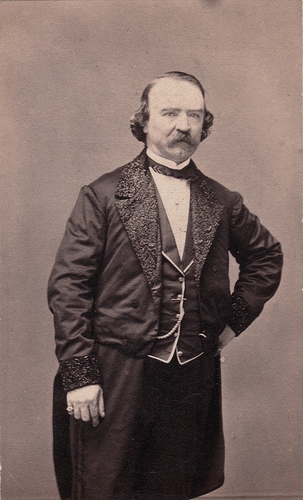
John Henry Anderson with his invisible pigeon